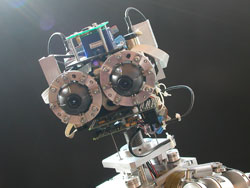News and developments from the field of interdisciplinary research.
Among other topics, you can find stimulating reports and articles related to microsystems, emotions research, futures research and stratospheric research.

The paper is a joint statement from the Presidents and Chairs of several specialty groups within the European Society of Cardiology – the European Association…

A team of military, telecommunications and surgical experts led by University of Cincinnati (UC) faculty are using an unmanned aircraft and sophisticated communication tools to take the next step toward making “telesurgery” a reality.
Telesurgery is a new approach to surgical care in which a surgeon performs operations using a surgical robot and advanced computer technology on a patient located miles away.
Timothy Broderick, MD, assistant professor of surgery at UC an

BabyBot, a robot modelled on the torso of a two year-old child, is helping researchers take the first, tottering steps towards understanding human perception, and could lead to the development of machines that can perceive and interact with their environment.
The researchers used BabyBot to test a model of the human sense of ’presence’, a combination of senses like sight, hearing and touch. The work could have enormous applications in robotics, artificial intelligence (AI) and mac

Center for Responsible Nanotechnology engages leading experts to discuss nanotech’s impact
The Center for Responsible Nanotechnology (CRN) today announced its first series of new research papers in which industry experts predict profound impacts of nanotechnology on society. Eleven original essays by members of CRN’s Global Task Force appear in the latest issue of the journal Nanotechnology Perceptions, published today. From military and security issues to human enhancement, ar

Transistor channels can detect single DNA base mutations
University of Pittsburgh researcher Alexander Star and colleagues at California-based company Nanomix, Inc., have developed devices made of carbon nanotubes that can find mutations in genes causing hereditary diseases, they report in the Jan. 16 issue of the journal Proceedings of the National Academy of Science. This method is less expensive and takes less time than conventional techniques.
Carbon nanotubes are ro

High performance computing is becoming increasingly important for international scientific research. It remains unclear, however, whether the conditions for its use (such as training of personnel, accessibility to computers and data, whether the programs are up-to-date, etc.) meet the requirements of modern scientific research. Another question addressed is how computer resources and collaborative platforms need to develop to allow scientists from disciplines as varied as astrophysics, chemistry, ma